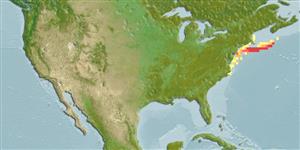Klassifizierung / Names
Namen | Synonyme | Catalog of Fishes(Gattung, Arten) | ITIS | CoL | WoRMS | Cloffa
Environment: milieu / climate zone / depth range / distribution range
Ökologie
seewasser bathydemersal; tiefenbereich 10 - 1000 m (Ref. 43481). Deep-water
Northwest Atlantic: Cape Cod, USA.
Size / Gewicht / Alter
Maturity: Lm ? range ? - ? cm
Max length : 3.5 cm SL Männchen/unbestimmt; (Ref. 43481)
Kurzbeschreibung
Morphologie | Morphometrie
Rückenflossenweichstrahlen (insgesamt): 36; Wirbelzahl: 42. Skin uniformly gray, head beneath skin black. Coronal pore present. Skin pale, peritoneum blackish-brown, mouth and gill cavity pale. Coronal pore present. Mouth oblique at angle approximately 45° to horizontal. Gill rakers unmodified. Temporal and coronal pores very large, distinctly larger than other pores. Pectoral fin low, insertion strongly oblique, base almost horizontal, fin ray direction more ventral than posterior (Ref. 43481).
Life cycle and mating behavior
Geschlechtsreife | Fortpflanzung | Ablaichen | Eier | Fecundity | Larven
Chernova, N.V. and D.L. Stein, 2002. Ten new species of Psednos (Pisces, Scorpaeniformes: Liparidae) from the Pacific and North Atlantic oceans. Copeia 2002(3):755-778. (Ref. 43481)
IUCN Rote Liste Status (Ref. 130435)
Bedrohung für Menschen
Harmless
Nutzung durch Menschen
Mehr Information
NamenSynonymeMetabolismusRäuberÖkotoxikologieFortpflanzungGeschlechtsreifeAblaichenSpawning aggregationFecundityEierEientwicklung
Alter/GrößeWachstumLänge-GewichtLänge-LängeLängenhäufigkeitenMorphometrieMorphologieLarvenLarven Pop.Dyn.RekrutierungDichteBRUVS
ReferenzenAquakulturAquakultur ProfilZuchtlinienGenetikElectrophoresesVererbbarkeitKrankheitenVerarbeitungNutrientsMass conversion
PartnerBilderStamps, Coins Misc.LauteCiguateraGeschwindigkeitSchwimmstilKiemenoberflächeOtolithsGehirngrößeSehfähigkeit
Tools
Zusatzinformationen
Download XML
Internet Quellen
Estimates based on models
Preferred temperature (Ref.
123201): 7 - 12.5, mean 10.9 °C (based on 8 cells).
Phylogenetic diversity index (Ref.
82804): PD
50 = 0.5000 [Uniqueness, from 0.5 = low to 2.0 = high].
Bayesian length-weight: a=0.01000 (0.00244 - 0.04107), b=3.04 (2.81 - 3.27), in cm total length, based on all LWR estimates for this body shape (Ref.
93245).
Trophic level (Ref.
69278): 3.2 ±0.5 se; based on size and trophs of closest relatives
Widerstandsfähigkeit (Ref.
120179): hoch, Verdopplung der Population dauert weniger als 15 Monate. (Preliminary K or Fecundity.).
Fishing Vulnerability (Ref.
59153): Low vulnerability (10 of 100).
